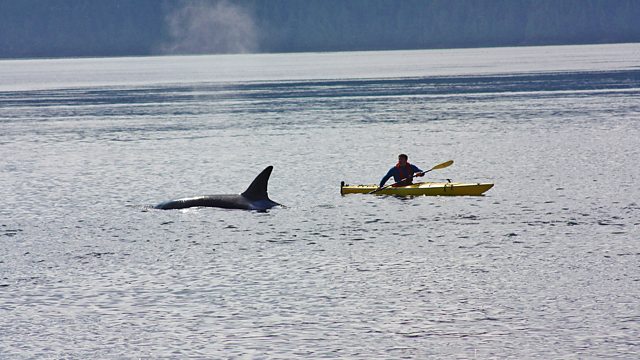Steve Backshall Listens to the Whales
Steve Backshall explores whether slowing down and quietening noisy shipping could help protect Canada’s whale population.
Steve Backshall explores whether slowing down and quietening noisy shipping could help protect Canada’s whale population.
A busy shipping lane between Vancouver Island and the Canadian mainland – known as the Inside Passage - is home to a community of Orcas. These are the unmistakable, sleek and distinctive, black and white members of the dolphin family otherwise known as Killer Whales. They’re smart and social and have a sophisticated language of clicks and whistles which helps them hunt and communicate within their family pods.
Paul Spong runs OrcaLab which, for over 50 years, has carried out research into these whales. He and his partner, Helena Symonds, have long suspected that noisy boats impact whales. Their experience of listening to these Orcas and monitoring their behaviour has shown that some family groups, associated with these waters, have left. Others only appear at the end of the cruise-liner season. There are hydrophone recordings which illustrate how propeller noise forces the orcas to ‘shout’ or stop communicating altogether which impacts family-pod relationships and hunting.
Broadening the research is Janie Wray of BC Whales. While Paul and Helena concentrate on Orcas, BC Whales also research Fins and Humpbacks. Janie's team has recently increased the string of hydrophones which now stretches along the entire coast of British Columbia. This development coincided with the pandemic when the oceans became a little quieter: for a while the cruise liners and whale-watching boats disappeared. This phase could provide a breakthrough - if the recordings made during these quieter months can prove that the whales benefitted from the peace, can boats be persuaded to slow down or even change route?
Another vital member of the research team is Dr. Ben Hendricks, he’s a software designer who has written a programme that can analyse vast amounts of recorded whale song very quickly, meaning humans no longer need to listen to everything in real time. All these different threads of research, when pulled together, could be enough to gather the evidence needed to further protect Canada’s resident and transient whale populations.
Also taking part in the programme is Erin Gless of the Pacific Whale Watch Association. She says whale watching vessels have made improvements to ensure they view wildlife in a non-invasive way.
The programme image is of Steve kayaking alongside an Orca.
Presenter: Steve Backshall
Producer for ����ý Audio in Bristol: Karen Gregor
Last on
More episodes
Previous
Next
Broadcasts
- Tue 6 Sep 2022 15:30����ý Radio 4
- Wed 7 Sep 2022 21:00����ý Radio 4
What has happened to the world's coral?
Podcast
-
![]()
Costing the Earth
Fresh ideas from the sharpest minds working toward a cleaner, greener planet



